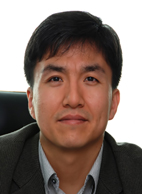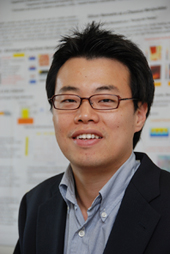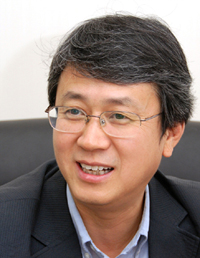Applications
-
 Prof. Cho Elected Editor-in-Chief of Systems Biology
Prof. Kwang-Hyun Cho of Department of Bio and Brain Engineering at KAIST has been recently elected editor-in-chief of the Systems Biology, an international journal published by the London-based Institution of Engineering and Technology (IET), the university authorities said on Wednesday (Sept. 23)
By the year 2012, Cho will oversee the editorial process of the journal covering intra- and inter-cellular dynamics, using systems- and signal-oriented approaches. IET, one of the world"s leading professional societies for the engineering and technology community, has a worldwide membership of more than 150,000.
Prof. Cho"s research interests cover the areas of systems science with bio-medical applications including systems biology and bio-inspired engineering based on molecular systems biology. He is currently an editorial board member of Systems and Synthetic Biology (Springer, Netherlands, from 2006), BMC Systems Biology (BMC, London, U.K., from 2007), Gene Regulation and Systems Biology (Libertas Academica, New Zealand, from 2007), and Bulletin of Mathematical Biology (Springer, New York, from 2008), and an editorial advisory board member of Molecular BioSystems (The Royal Society of Chemistry, U.K.).
2009.09.24 View 14615
Prof. Cho Elected Editor-in-Chief of Systems Biology
Prof. Kwang-Hyun Cho of Department of Bio and Brain Engineering at KAIST has been recently elected editor-in-chief of the Systems Biology, an international journal published by the London-based Institution of Engineering and Technology (IET), the university authorities said on Wednesday (Sept. 23)
By the year 2012, Cho will oversee the editorial process of the journal covering intra- and inter-cellular dynamics, using systems- and signal-oriented approaches. IET, one of the world"s leading professional societies for the engineering and technology community, has a worldwide membership of more than 150,000.
Prof. Cho"s research interests cover the areas of systems science with bio-medical applications including systems biology and bio-inspired engineering based on molecular systems biology. He is currently an editorial board member of Systems and Synthetic Biology (Springer, Netherlands, from 2006), BMC Systems Biology (BMC, London, U.K., from 2007), Gene Regulation and Systems Biology (Libertas Academica, New Zealand, from 2007), and Bulletin of Mathematical Biology (Springer, New York, from 2008), and an editorial advisory board member of Molecular BioSystems (The Royal Society of Chemistry, U.K.).
2009.09.24 View 14615 -
 KAIST Undergraduates Open Four-Day International Conference
The ICISTS-KAIST, an annual international conference organized by KAIST undergraduate students, opened on Thursday (Aug. 20) at the KAIST"s main campus in Daejeon.
The 2009 ICISTS (International Conference for the Integration of Science and Technology into Society) drew around 200 experts and students from 44 countries. Since its inception in 2005 to promote discourse on important science and technology issues affecting modern society, the conference has served as an opportunity for academic networking among students in various parts of the world.
The four-day conference consists of lectures, open discussions among lecturers and students, field trips to help students to understand actual applications, and team projects.
This year"s conference offers three workshops under the themes of "Climate Change: Merging Technology and Policy for Green Solutions"; "Human-Computer Interaction: Designing Computer System for Intuitive Human Access"; and "Nano Clinic: Breakthrough in Conquering Disease."
Lectures by invited experts in various scientific fields will help broaden students" perspectives particularly from interdisciplinary viewpoints, said an organizer of the conference.
2009.08.28 View 13511
KAIST Undergraduates Open Four-Day International Conference
The ICISTS-KAIST, an annual international conference organized by KAIST undergraduate students, opened on Thursday (Aug. 20) at the KAIST"s main campus in Daejeon.
The 2009 ICISTS (International Conference for the Integration of Science and Technology into Society) drew around 200 experts and students from 44 countries. Since its inception in 2005 to promote discourse on important science and technology issues affecting modern society, the conference has served as an opportunity for academic networking among students in various parts of the world.
The four-day conference consists of lectures, open discussions among lecturers and students, field trips to help students to understand actual applications, and team projects.
This year"s conference offers three workshops under the themes of "Climate Change: Merging Technology and Policy for Green Solutions"; "Human-Computer Interaction: Designing Computer System for Intuitive Human Access"; and "Nano Clinic: Breakthrough in Conquering Disease."
Lectures by invited experts in various scientific fields will help broaden students" perspectives particularly from interdisciplinary viewpoints, said an organizer of the conference.
2009.08.28 View 13511 -
 Prof. Park to Receive HP's Annual Innovation Research Award
Prof. In-Kyu Park of the Department of Mechanical Engineering, KAIST, has been will receive an award from Hewlett-Packard"s second annual Labs Innovation Research Program, university authorities said on Wednesday (July 8).
Prof. Park was chosen as the winner of the research award for his paper entitled "Eco-friendly nanomanufacturing for intelligent environment sensing applications."
Sixty projects from 46 universities in 12 countries were selected as the recipients of the awards from HP Labs, the company"s central research arm. The program is designed to create opportunities for colleges, universities and research institutes to conduct collaborative research with HP.
HP Labs Innovation Research Awards provide project funding of up to $100,000 for one year to each of the chosen academic institutions, which is renewable for up to three years based on research progress and HP business requirements.
Prof. Park has conducted joint researches on nanoimprinting, nanosensors, and nanoelectronics with HP"s Information and Quantum Systems Lab since 2005. Starting from the later half of 2009, he is to receive research grants under the industry-academia cooperation program of the world"s information technology giant firm.
2009.07.09 View 12748
Prof. Park to Receive HP's Annual Innovation Research Award
Prof. In-Kyu Park of the Department of Mechanical Engineering, KAIST, has been will receive an award from Hewlett-Packard"s second annual Labs Innovation Research Program, university authorities said on Wednesday (July 8).
Prof. Park was chosen as the winner of the research award for his paper entitled "Eco-friendly nanomanufacturing for intelligent environment sensing applications."
Sixty projects from 46 universities in 12 countries were selected as the recipients of the awards from HP Labs, the company"s central research arm. The program is designed to create opportunities for colleges, universities and research institutes to conduct collaborative research with HP.
HP Labs Innovation Research Awards provide project funding of up to $100,000 for one year to each of the chosen academic institutions, which is renewable for up to three years based on research progress and HP business requirements.
Prof. Park has conducted joint researches on nanoimprinting, nanosensors, and nanoelectronics with HP"s Information and Quantum Systems Lab since 2005. Starting from the later half of 2009, he is to receive research grants under the industry-academia cooperation program of the world"s information technology giant firm.
2009.07.09 View 12748 -
 KAIST Team Identifies Nano-scale Origin of Toughness in Rare Earth-added Silicon Carbide
A research team led by Prof. Do-Kyung Kim of the Department of Materials Science and Engineering of KAIST has identified the nano-scale origin of the toughness in rare-earth doped silicon carbide (RE-SiC), university sources said on Monday (Oct. 6).
The research was conducted jointly with a U.S. team headed by Prof. R. O. Ritchie of the Department of Materials Science and Engineering, University of California, Berkeley.
The findings were carried in the online edition of Nano Letters published by the American Chemical Association.
Silicon carbide, a ceramic material known to be one of the hardest substances, are potential candidate materials for many ultrahigh-temperature structural applications. For example, if SiC, instead of metallic alloys, is used in gas-turbine engines for power generation and aerospace applications, operating temperatures of many hundred degrees higher can be obtained with a consequent dramatic increase in thermodynamic efficiency and reduced fuel consumption. However, the use of such ceramic materials has so far been severely limited since the origin of the toughness in RE-SiC remained unknown thus far.
In order to investigate the origin of the toughness in RE-SiC, the researchers attempted to examine the mechanistic nature of the cracking events, which they found to occur precisely along the interface between SiC grains and the nano-scale grain-boundary phase, by using ultrahigh-resolution transmission electron microscopy and atomic-scale spectroscopy. The research found that for optimal toughness, the relative elastic modulus across the grain-boundary phase and the interfacial fracture toughness are the most critical material parameters; both can be altered with appropriate choice of rare-earth elements.
In addition to identifying the nano-scale origin of the toughness in RE-SiC, the findings also contributed to precisely predicting how the use of various rare-earth elements lead to difference in toughness.
University sources said that the findings will significantly advance the date when RE-SiC will replace metallic alloys in gas-turbine engines for power generation and aerospace applications.
2008.10.08 View 13887
KAIST Team Identifies Nano-scale Origin of Toughness in Rare Earth-added Silicon Carbide
A research team led by Prof. Do-Kyung Kim of the Department of Materials Science and Engineering of KAIST has identified the nano-scale origin of the toughness in rare-earth doped silicon carbide (RE-SiC), university sources said on Monday (Oct. 6).
The research was conducted jointly with a U.S. team headed by Prof. R. O. Ritchie of the Department of Materials Science and Engineering, University of California, Berkeley.
The findings were carried in the online edition of Nano Letters published by the American Chemical Association.
Silicon carbide, a ceramic material known to be one of the hardest substances, are potential candidate materials for many ultrahigh-temperature structural applications. For example, if SiC, instead of metallic alloys, is used in gas-turbine engines for power generation and aerospace applications, operating temperatures of many hundred degrees higher can be obtained with a consequent dramatic increase in thermodynamic efficiency and reduced fuel consumption. However, the use of such ceramic materials has so far been severely limited since the origin of the toughness in RE-SiC remained unknown thus far.
In order to investigate the origin of the toughness in RE-SiC, the researchers attempted to examine the mechanistic nature of the cracking events, which they found to occur precisely along the interface between SiC grains and the nano-scale grain-boundary phase, by using ultrahigh-resolution transmission electron microscopy and atomic-scale spectroscopy. The research found that for optimal toughness, the relative elastic modulus across the grain-boundary phase and the interfacial fracture toughness are the most critical material parameters; both can be altered with appropriate choice of rare-earth elements.
In addition to identifying the nano-scale origin of the toughness in RE-SiC, the findings also contributed to precisely predicting how the use of various rare-earth elements lead to difference in toughness.
University sources said that the findings will significantly advance the date when RE-SiC will replace metallic alloys in gas-turbine engines for power generation and aerospace applications.
2008.10.08 View 13887 -
 Ju-pyeong Lee won the Best Paper Award from IEEE RTAS
Ju-pyeong Lee, doctoral student of the Dept. of Electrical Engineering of KAIST, received the Best Paper Award from the 11th Institute of Electrical and Electronics Engineers Real-Time and Embedded Technology and Applications Symposium (IEEE RTAS) sponsored by IEEE TC on Real Time System and supported from the U.S. National Science Foundation.
He is in the Computer Engineering laboratory, and won the honor by his research of technique of Delayed Locking Technique for Improving Real-Time Performance of Embedded Linux by Prediction of Timer Interrupt. His paper was selected to be the best because of its practicality. His research purposed the technique that can dramatically improve real time problem, which was indicated to be the big problem of Linux. Moreover, he presented the way to easily materialize this technique in the practical system.
Best Paper Award is the prize awarded by IEEE Computer Society in the recognition of outstanding achievement in the field of real time system and embedded technology.
IEEE RTAS is a symposium held annually by IEEE. In this year, the 11th symposium was held from March 7 to March 10, for four days, in San Francisco, United States. The purpose of this year symposium was to seek papers describing significant contributions both to state of the art and state of the practice in the broad field of embedded and open real-time computing, control, and communication. Therefore, it especially focused on online real-time and embedded applications ranging from industrial embedded applications such as aeronautics and automotive systems to open multimedia, telecommunication and mobile computing systems.
Approximately 200 related erudite from almost 20 countries including United States, England, France, Germany, Italy, and Sweden participated in this symposium. Total number of papers submitted to IEEE RTAS was 158, while only 53 of them were selected.
by Hye-jung Won / Staff ReporterApril, 2005 / The KAIST Herald
2005.04.12 View 15947
Ju-pyeong Lee won the Best Paper Award from IEEE RTAS
Ju-pyeong Lee, doctoral student of the Dept. of Electrical Engineering of KAIST, received the Best Paper Award from the 11th Institute of Electrical and Electronics Engineers Real-Time and Embedded Technology and Applications Symposium (IEEE RTAS) sponsored by IEEE TC on Real Time System and supported from the U.S. National Science Foundation.
He is in the Computer Engineering laboratory, and won the honor by his research of technique of Delayed Locking Technique for Improving Real-Time Performance of Embedded Linux by Prediction of Timer Interrupt. His paper was selected to be the best because of its practicality. His research purposed the technique that can dramatically improve real time problem, which was indicated to be the big problem of Linux. Moreover, he presented the way to easily materialize this technique in the practical system.
Best Paper Award is the prize awarded by IEEE Computer Society in the recognition of outstanding achievement in the field of real time system and embedded technology.
IEEE RTAS is a symposium held annually by IEEE. In this year, the 11th symposium was held from March 7 to March 10, for four days, in San Francisco, United States. The purpose of this year symposium was to seek papers describing significant contributions both to state of the art and state of the practice in the broad field of embedded and open real-time computing, control, and communication. Therefore, it especially focused on online real-time and embedded applications ranging from industrial embedded applications such as aeronautics and automotive systems to open multimedia, telecommunication and mobile computing systems.
Approximately 200 related erudite from almost 20 countries including United States, England, France, Germany, Italy, and Sweden participated in this symposium. Total number of papers submitted to IEEE RTAS was 158, while only 53 of them were selected.
by Hye-jung Won / Staff ReporterApril, 2005 / The KAIST Herald
2005.04.12 View 15947